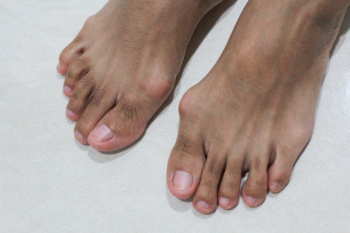
Bunions are a common foot deformity that appears as a bony bump at the base of the big toe. They often develop due to genetics, flat feet, arthritis, or prolonged wearing of tight or narrow shoes. Symptoms include swelling, stiffness, and pain that worsens with walking or shoe pressure. As the big toe begins to lean toward the second toe, the base of the toe pushes outward causing a deformity. In mild cases, a podiatrist can help with conservative treatments, such as padding, custom orthotics, footwear modifications, and anti-inflammatory medications. However, when pain becomes constant, mobility is limited, or if the bunion interferes with daily activities, surgery may be necessary to realign the bones and relieve discomfort. A podiatrist will evaluate the severity of the bunion through a physical exam and X-rays and determine whether surgery is needed. It is suggested that you schedule an appointment with a podiatrist if a bunion is causing ongoing pain or difficulty with wearing footwear.
If you are suffering from bunion pain, contact Keleigh Muxlow, DPM of Colorado. Our doctor can provide the care you need to keep you pain-free and on your feet.
What Is a Bunion?
Bunions are painful bony bumps that usually develop on the inside of the foot at the joint of the big toe. As the deformity increases over time, it may become painful to walk and wear shoes. Women are more likely to exacerbate existing bunions since they often wear tight, narrow shoes that shift their toes together. Bunion pain can be relieved by wearing wider shoes with enough room for the toes.
Causes
- Genetics – some people inherit feet that are more prone to bunion development
- Inflammatory Conditions - rheumatoid arthritis and polio may cause bunion development
Symptoms
- Redness and inflammation
- Pain and tenderness
- Callus or corns on the bump
- Restricted motion in the big toe
In order to diagnose your bunion, your podiatrist may ask about your medical history, symptoms, and general health. Your doctor might also order an x-ray to take a closer look at your feet. Nonsurgical treatment options include orthotics, padding, icing, changes in footwear, and medication. If nonsurgical treatments don’t alleviate your bunion pain, surgery may be necessary.
If you have any questions, please feel free to contact our office located in Littleton, CO . We offer the newest diagnostic and treatment technologies for all your foot care needs.
